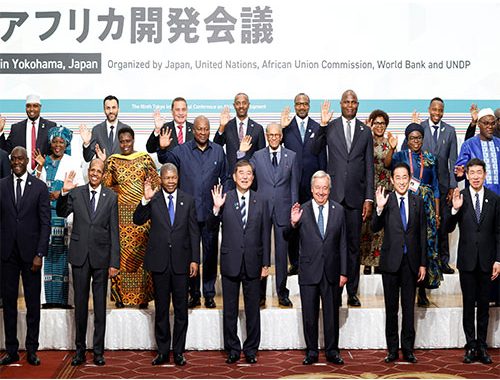The ninth Tokyo International Conference on African Development (TICAD), took place from August 20 to 22 in Yokohama, Japan. With the theme “Co-Create Innovative Solutions with Africa,” TICAD9 aimed to capitalise on both Japanese innovation capacity and African creativity.
International organisation leaders are among the approximately fifty African heads of state or high-ranking delegates in attendance. TICAD9 was also attended by Cyril Ramaphosa, the president of South Africa. An Indian Ocean-Africa commercial Zone was proposed by Prime Minister Shigeru Ishiba in an effort to strengthen commercial ties between the Middle East, India, the Indian Ocean region and Africa.
He has unveiled a US$5.5 billion credit plan that was arranged with the African Development Bank to help Africa’s debt problems and promote sustainable development. In order to support the digital transformation of economies and increase job creation, he also promised to train 30,000 AI specialists over the course of the following three years.
Japan is the initiator and launcher of the Tokyo International Conference on African Development (TICAD), an international conference. It is Japan’s premier diplomatic endeavour that strengthens ties between Japan and Africa while offering a forum for cooperation between Africa, Japan and other nations.
In 1993, the UN, UNDP, World Bank and African Union Commission co-hosted the first TICAD in Tokyo. Every three years, the meeting alternates between Africa and Japan. Through TICAD, Japan and international organisations collaborate with Africa to advance sustainable development, peace, stability and prosperity. Africa leads, with cooperation from international partners, in a partnership that goes beyond aid. All partners, including nations, organisations, the commercial sector and civil society, our encouraged to use the platform.
TICAD’s goal is to advance Africa’s development, with a particular emphasis on industrialisation, sustainable development, economic expansion and conflict avoidance in African nations; bolster collaboration by giving African nations, Japan, international organisations, development partners and the private sector a forum to work together.
Japan has a strategic but gentle influence in Africa, relying more on technology and assistance diplomacy than on force. From US $8 billion in 2000 to US$24 billion in the early 2020s, Japan’s commerce with Africa has increased significantly. Additionally, it agreed to provide US $5 billion in co-financing with the African Development Bank for a credit line for African and Japanese start-ups, with US $4 billion going towards a green growth initiative and training 30,000 African professionals in fields such as public administration and medicine. Under PM Shinzo Abe, TICAD developed into a platform for growing aid and corporate partnerships.
As of January 2025, Japan has 41 resident embassies on the continent, expanding its diplomatic presence. Japan and the UN Economic Commission for Africa began a US$1 million initiative in May 2025 to help implement the African Continental Free Trade Area (AFCFTA).
Japan gave Madagascar a loan of €350 million and technical assistance to support the expansion of the Toamasina Port, Senegal a loan of US $4.7 million to repair Mole 3 at Dakar Port and the Ivorian government a further loan of 10 billion CFA Francs to fund the building of the Grain Terminal at the Autonomous Port of Abidjan. When PM Kishida visited Ghana in May 2023, he promised to use US $500 million over three years to promote peace and security in the Sahel and Gulf of Guinea.
Japanese companies invest in the energy, infrastructure and industrial industries. Japan is one of Africa’s most significant development partners. Japan is concentrating on infrastructure, healthcare, education and technology. Japan is now a major player on the continent and its connection with Africa has developed into a stronger friendship and cooperative partnership throughout time.

